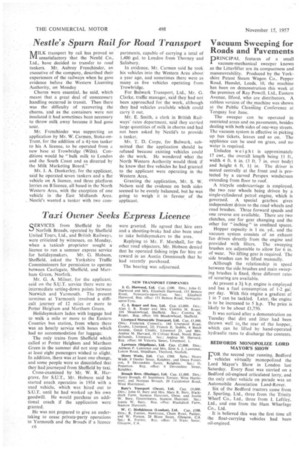Nestle's Spurn Rail for Road Transport Vacuum Sweeping for
Page 42

If you've noticed an error in this article please click here to report it so we can fix it.
hAILK transport by rail has proved so 1V.I. unsatisfactory that the Nestle Co„ Ltd., have decided to transfer to road tankers. Mr. Aubrey Frenchinder, an executive of the company, described their experiences of the railways when he gave evidence before the Western Licensing Authority, on Monday Churns were essential, he said, which meant that a great deal of unnecessary handling occurred in transit. Then there was the difficulty of recovering the churns, and as the containers were not insulated it had sometimes been necessary to throw milk away because it had gone sour.
Mr. Frenchinder was supporting an application by Mr. W. Carmen, Stoke-onTrent, for the addition of a 4f-ton tanker to his A licence, to be operated from a new base at Trowbridge (Wilts). Conditions would be "bulk milk to London and the South Coast and as directed by the Milk Marketing Board."
Mr. J. A. Dunkerley, for the applicant, said he operated seven tankers and a flat vehicle on A licence, and three platform lorries on B licence, all based in the North Western Area, with the exception of one vehicle in the East Midlands Area. Nestle's wanted a tanker with two corn partments, capable of carrying a total of 1,400 gal. to London from Thorney and Salisbury, ln evidence, Mr. Carmen said he took his vehicles into the Western Area about a year ago, and sometimes there were as many as five vehicles operating from Trowbridge.
For Bulwark Transport, Ltd., Mr. G. Clarke, traffic manager, said they had not been approached for the work, although they had vehicles available which could carry it out.
Mr. E. Smith, a clerk in British Railways rates department, said they carried large quantities of milk in churns and had not been asked by Nestle's to provide a tanker.
Mr. T. D. Corpe, for Bulwark, submitted that the application should be refused because existing vehicles could do the work. He wondered what the North Western Authority would think if he knew that five vehicles he had granted to the applicant were operating in the Western Area.
Granting the application, Mr. S. W. Nelson said the evidence on both sides seemed to be evenly balanced, but he was going to weigh it in favour of the applicant.








































































































